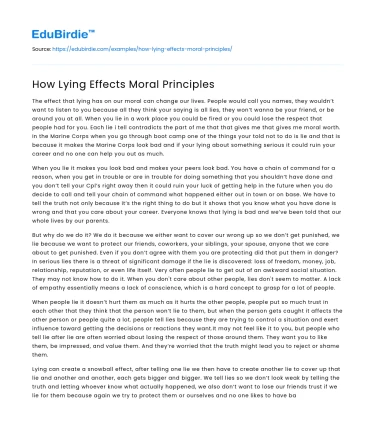The effect that lying has on our moral can change our lives. People would call you names, they wouldn’t want to listen to you because all they think your saying is all lies, they won’t wanna be your friend, or be around you at all. When you lie in a work place you could be fired or you could lose the respect that people had for you. Each lie i tell contradicts the part of me that that gives me that gives me moral worth. In the Marine Corps when you go through boot camp one of the things your told not to do is lie and that is because it makes the Marine Corps look bad and if your lying about something serious it could ruin your career and no one can help you out as much.
When you lie it makes you look bad and makes your peers look bad. You have a chain of command for a reason, when you get in trouble or are in trouble for doing something that you shouldn’t have done and you don’t tell your Cpl’s right away then it could ruin your luck of getting help in the future when you do decide to call and tell your chain of command what happened either out in town or on base. We have to tell the truth not only because it’s the right thing to do but it shows that you know what you have done is wrong and that you care about your career. Everyone knows that lying is bad and we’ve been told that our whole lives by our parents.
But why do we do it? We do it because we either want to cover our wrong up so we don’t get punished, we lie because we want to protect our friends, coworkers, your siblings, your spouse, anyone that we care about to get punished. Even if you don’t agree with them you are protecting did that put them in danger? In serious lies there is a threat of significant damage if the lie is discovered: loss of freedom, money, job, relationship, reputation, or even life itself. Very often people lie to get out of an awkward social situation. They may not know how to do it. When you don't care about other people, lies don't seem to matter. A lack of empathy essentially means a lack of conscience, which is a hard concept to grasp for a lot of people.
When people lie it doesn’t hurt them as much as it hurts the other people, people put so much trust in each other that they think that the person won’t lie to them, but when the person gets caught it affects the other person or people quite a lot. people tell lies because they are trying to control a situation and exert influence toward getting the decisions or reactions they want.It may not feel like it to you, but people who tell lie after lie are often worried about losing the respect of those around them. They want you to like them, be impressed, and value them. And they’re worried that the truth might lead you to reject or shame them.
Lying can create a snowball effect, after telling one lie we then have to create another lie to cover up that lie and another and another, each gets bigger and bigger. We tell lies so we don’t look weak by telling the truth and letting whoever know what actually happened, we also don’t want to lose our friends trust if we lie for them because again we try to protect them or ourselves and no one likes to have back up when we know we did something wrong so we lie and we have our friend or someone help cover it up with you by lying with you so one or both of you don’t get in trouble and it seems more real when two people lie about the same thing with a fake story. When someone says a lie, it’s often because they genuinely believe, at that moment, that it is the truth. Their memory has been overwhelmed by stress, current events, and their desire to find a way to make this situation work. Sometimes this can become so severe that the person almost seems to have created a complete alternate world in their head, one that conforms to their moment-by-moment beliefs and needs.
A lie may be described as a statement that misrepresents, conceals, distorts, or suppresses the truth, and that is usually made for the purpose of deceiving someone. The act of lying is usually an act of intentionally trying to deceive someone by making a false statement or misrepresenting, concealing, or distorting the truth. A person who thinks that, and acts as if, he is telling the whole truth about something may not actually know the whole truth about that thing, and thus he may be viewed as an untrustworthy and unreliable source of information by those who are aware of his incomplete knowledge of that thing. If he is actually aware that he does not know the whole truth and yet claims to know the whole truth, then he may be trying to deceive others about the extent of his knowledge, and he may in fact be lying. If it is not possible for a person to know the whole truth about something, then it might be mistaken for him to pretend that he knows the whole truth about that thing if he intends to mislead or deceive others into having false beliefs about that thing.






 Stuck on your essay?
Stuck on your essay?

